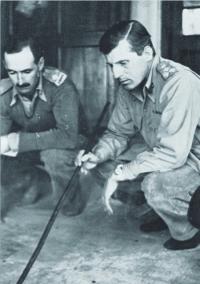
Major R.B. Bromhead(l) with Chindits' commander, Orde Charles Wingate(r) with cane.
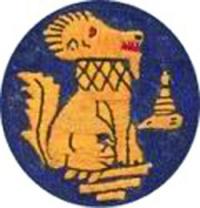
Chindits' insignia
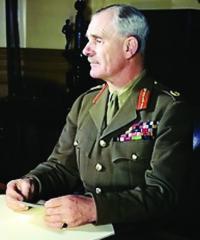
Field Marshal Sir Archibald Wavell, Commander-in-Chief, India.
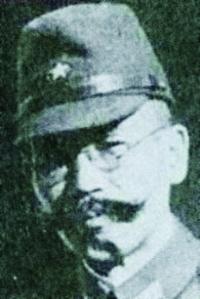
Masakazu Kawabe, commander Burma Area Army.
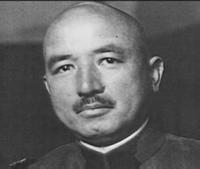
Renya Mutaguchi, commander Japanese 15th Army from March 18, 1943.
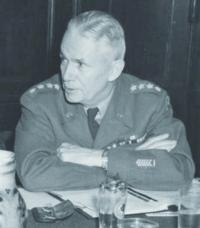
American General Brehon Somervell
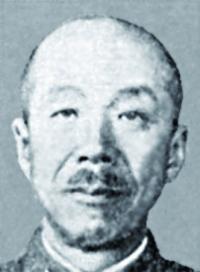
Japanese General Shojiro Iida
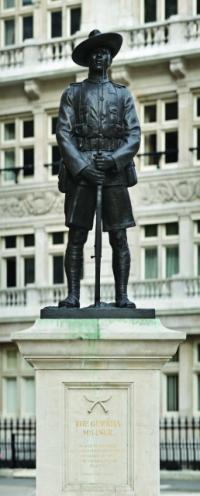
Monument to Gurkha Soldier, Horse Guards Avenue, London.
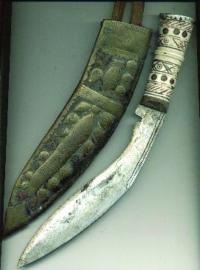
Khukri knife - a Ghurka trademark
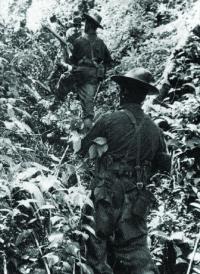
Chindit Gurkhas move forward in the Burmese jungle.
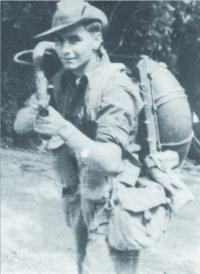
Chindit with flamethrower
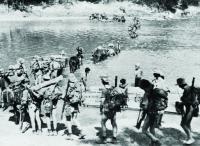
Chindit column crossing a river in Burma. Those suffering dysentery often went naked.
This week, 70 years ago, the "Chindits" were in the midst of their first operation in the jungles of Burma. The Chindits - officially known as the 77th Indian Infantry Brigade - were a 3,000 man force, comprised of British, Burmese, Indian and Nepalese Ghurka soldiers, led by Orde Charles Wingate. The Ghurkas were some of the bravest and best soldiers ever to serve in the British Army. The Chief-of-Staff of the Indian Army, Field Marshal Sam Manekshaw, who also served in the British Army, once said, "If a man says he is not afraid of dying, he is either lying or is a Ghurka."
The purpose of the operation was to penetrate behind enemy lines in the Burmese jungle. They were to be supplied, when they were supplied, from the air. It was described as "long range penetration" - LRP. The name "Chindit" was derived from WingateÙs misinterpretation of the Burmese word for lion, "chinthe."
Wingate was an odd character, with many detractors and an unconventional approach to warfare. He raised, trained and led the Jewish "Special Night Squads" to combat the Arabs in Palestine in the 1930s. During the early part of WWII, he created the "Gideon Force," comprised of Ethiopian, Sudanese, British and some veterans of the "Special Night Squads" during the East African Campaign against the Italians. He and the "Gideon Force" accompanied Emperor Haile Selassie in his triumphal return to the Ethiopian capital of Addis Ababa in May 1941. Field Marshal Bernard Law Montgomery considered Wingate "...mentally unbalanced and that the best thing he ever did was get killed in a plane crash in 1944."
The Japanese, with the help of their Thai allies, had conquered Burma, from the British, in 1942. The capital, Rangoon, was captured in March, by the 15th Army, commanded by Shojio Iida. Mandalay fell in May. The Thais occupied the Shan States and Kayah State which were located on their border, and which Thailand had long claimed. The Japanese occupied the rest of the country.
On February 7, 1943, Field Marshal Viscount Sir Archibald Wavell, Commander-in-Chief, India, arrived at Chindit headquarters, inclined towards cancellation of the proposed operation which was code named "Longcloth." However, after hearing WingateÙs impassioned plea, Wavell asked the opinion of American General Brehon Somervell, Army Service Forces commander, who said, "Well, I guess IÙd let them roll." Sir Archibald then reviewed the Chindits as they marched past, telling them, "This is a great adventure. It is not going to be an easy one. I wish you all the best of luck."
The soldiers had been divided into two groups. The Southern Group consisted of 1,000 men and 250 mules. The Northern Group consisted of 2,000 men and 850 mules. The Southern Group was meant to act as a decoy and deceive the Japanese, while the Northern Group cut the railway lines between Myitkyina and Mandalay in northern Burma and the Mandalay-Lashio line On February 13th, the Northern Group crossed the Chindwin River into Burma and Japanese held territory. The first problem was getting the mules across the Chindwin River. In spite of the many, large and small, rivers in Burma, the Chindits had not trained for river crossing!
Things did not go well for the Chindits. The Southern Group soon fell behind schedule. They were supposed to ambush the 250-man garrison at Maingnyaung, on February 18, but a skirmish with a Japanese patrol alerted the main body, which opened up with mortars, stampeding the mules. On the night of March 3-4 the Southern Group was ambushed, losing about half their number. Remnants finally arrived at the Irrawaddy River.
On the evening of March 3-4, one of the Northern Group units was also ambushed. It was commanded by Major R.B. Bromhead. Major Bromhead was descended from a long line of British officers. His family included Lt. Gonville Bromhead, (played by Michael Caine in the movie Zulu) who was second-in-command at RorkeÙs Drift in South Africa, in 1879, when his command held off an overwhelming number of Zulus, for which he was awarded the VictoriaÙs Cross. As a result of the ambush he led his men back to Assam, India.
On March 6th, Chindits achieved some success when they successfully assaulted the 800-man strong garrison at Pinlievu, while destroying the Wuntho-Indaw Railway Line. The Pinlievu defenders suffered about a 30 percent loss in killed. The remnants of the Southern Group, after blowing a railroad bridge at Kyaikthin, had crossed the Irrawaddy River on March 10th.
By March 18th, all of the Chindits were across the mile wide Irrawaddy. The same day, Renya Mutaguchi replaced General Iida as commander of the Japanese 15th Army, which became a part of Burma Area Army, commanded by Masakazu Kawabe, occupying Burma.
The next day Wingate gave the order to retire to India saying, "We can get new equipment and wireless sets. But it will take 25 years to get another man. These men have done their job, their experience is a premium."
The Chindits began recrossing the Chindwin River on April 14th. The men were reduced to sucking the fluid from green bamboo stems, when they could find them; butchering the mules for meat, making stews of monkey, rats, locust and cockroaches, all the while being covered with lice and leeches. On April 13th, Wingate and the main body, or most of it, crossed the Irrawaddy. Before all could cross, the Japanese arrived and the rear guard was left to fend for itself. One group recrossed the Chindwin on April 24th and arrived two days later, with less than one-third of its original total. On April 27th, Wingate and his men finally arrived at the Chindwin which, at that point, was 500 yards wide, with a fast-flowing current. Wingate had the men who had the strength to swim, swim it and once on the other side, contacted a company of Gurkha Rifles, who returned with boats to rescue those too weak to swim. Even at that, they had to fight off the Japanese.
After having traveled by foot through 1000 miles of Burmese jungle, of the 3,000 men who began the expedition, 2,182 returned to India. About 450 had been killed in action. The rest were "missing" or died in captivity. Of those who did return, only 600 were fit for active duty thereafter. One of WingateÙs officers said,
"What did we accomplish? Not much that was tangible. What there was became distorted in the glare of publicity soon after our return. We blew up bits of railway, which did not take long to repair; we gathered some useful intelligence; we distracted the Japanese from some minor operations, and possibly from some bigger ones; we killed a few hundreds of an enemy, which numbers 80 millions; we proved that it was feasible to maintain a force by supply dropping along."
The Gurkha official history, mimicking ChurchillÙs reference to the RAF pilots credited with saving their country during the Battle of Britain, said that, "Never have so many marched so far for so little."
Although an objective assessment of this mission has to rate it a failure, it did have a positive effect on Allied morale in the China-Burma-India Theater. Finally, the Allies were landing a blow against the Japanese. And, with his high-placed friends - Churchill, Wavell - Wingate was able to organize a second expedition. The Americans were even inspired to emulate the Chindits with their "Marauders," led by Frank Merrill.
NEXT: THE ASSASSINATION OF JAPANESE ADMIRAL ISOROKU YAMAMOTO
Mr. Wimbrow writes from Ocean City, Maryland, where he practices law representing those persons accused of criminal and traffic offenses, and those persons who have suffered a personal injury through no fault of their own. Mr. Wimbrow can be contacted at wimbrowlaw@gmail.com.
«Go back to the previous page.











